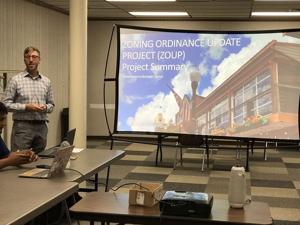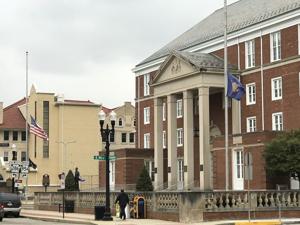Reading view
Colombia’s Emerging Cleantech Story: Innovation Amidst Biodiversity
When people think of Colombia, they often picture coffee plantations, pristine beaches, and the vibrancy of Bogotá or Medellín. What truly sets the...
The post Colombia’s Emerging Cleantech Story: Innovation Amidst Biodiversity appeared first on Cleantech Group.
Judge: Planned Parenthood clinics can remain Medicaid providers while lawsuit continues

With a new law cutting Medicaid funding to certain clinics, Planned Parenthood estimates 200 of its clinics in 24 states are at risk of closure with the cuts, and nearly all of those clinics — 90% — are in states where abortion is legal. (Photo by Kayla Bartkowski/Getty Images)
A federal judge ruled Friday against the Trump administration’s efforts to strip Medicaid funds from primarily Planned Parenthood-affiliated abortion providers.
Massachusetts U.S. District Judge Indira Talwani denied the federal government’s motion to lift a block on a new law, rejecting the U.S. Department of Justice’s argument that allowing Planned Parenthood to continue to bill for Medicaid while their lawsuit plays out would cause the government “irreparable injury.” She said the plaintiffs were more likely to suffer injury if the provision went into effect, such as having to close clinics and reduce services.
“Here, Defendants suffer no irreparable harm where Plaintiffs are substantially likely to succeed in establishing that Section 71113 violates several constitutional provisions,” Talwani wrote in an order, denying the federal government’s request to stay two preliminary injunctions. “[I]t is precisely because Congress targeted only a ‘certain’ group of entities for exclusion from Medicaid programs — all but two of which are Planned Parenthood Federation Members — that Plaintiffs are likely to succeed in establishing that Section 71113 is unconstitutional.”
Late last month Talwani ordered a partial and then a full preliminary injunction after Planned Parenthood Federation of America and its Massachusetts and Utah affiliates sued in early July over the new federal reproductive health restriction. After unsuccessfully asking the district court to lift the block, the federal government appealed the preliminary injunctions to the U.S. Court of Appeals for the First Circuit. Shortly after, the DOJ filed a motion asking the district court to reconsider the preliminary injunctions. Last week, the appellate court declined the government’s request, pending the district court’s decision. Defendants are now expected to re-appeal the injunction to the First Circuit.
The provision, set to expire July 4, 2026, would primarily affect health clinics affiliated with Planned Parenthood, which has estimated it could lose 200 of its 600 clinics, many of which are in rural areas and others that are critical abortion-access points.
But two other affected organizations are Health Imperatives in Massachusetts, which according to WBUR, operates seven clinics and serves about 10,000 patients, and Maine Family Planning, which has also sued over the provision. On Monday, U.S. District Judge Lance Walker in Maine, an appointee of President Donald Trump, denied Maine Family Planning’s motion for a preliminary injunction, despite the organization facing losses up to nearly $2 million, potential layoffs, and disruption of care for about 8,000 patients.
“This ruling is a devastating setback for Mainers who depend on us for basic primary care,” said George Hill, president and CEO of Maine Family Planning, according to Maine Morning Star. “The loss of Medicaid funds — which nearly half our patients rely on — threatens our ability to provide life-saving services to communities across the state. Mainers’ health should never be jeopardized by political decisions, and we will continue to fight for them.”
Does the new federal Medicaid rule unlawfully target Planned Parenthood?
Federal funding of abortion is already prohibited in most cases under the Hyde Amendment. But the new funding rule would bar from the Medicaid program reproductive health clinics that provide abortions and received more than $800,000 in federal and state Medicaid funding in fiscal year 2023 for health services like birth control, cancer and gender-affirming care.
The legislation has caused confusion throughout the Planned Parenthood network because its definition of “prohibited entity” includes a barred organization’s “affiliates, subsidiaries, successors, and clinics.”
The nonprofit health network comprises its national membership and advocacy organization, PPFA, and nearly 50 independently structured and operated affiliates, some of which do not offer abortion, such as co-plaintiff Planned Parenthood Association of Utah. These organizations are reimbursed after the fact for specific health services covered by Medicaid.
Even though the provision is currently blocked, several Planned Parenthood clinics around the country have already closed, both because of the new rule and the Trump administration’s other restrictions stripping abortion providers of federal family planning grants.
Many of the recently shuttered clinics did not provide abortion, like in Ohio, and some are in states where abortion is illegal, like in Louisiana.
Planned Parenthood’s attorneys have argued that the new federal Medicaid rule violates their equal protection, speech and association rights, because it excludes their clinics from the Medicaid program on the basis of their association to other organizations — in this case organizations that provide abortions and advocate for abortion rights.
“[S]ince this Court issued its decision, the government has now admitted that Section 71113 (the “Defund Provision”) was intended to punish Planned Parenthood for its ‘political advocacy,’” the plaintiffs wrote in a recent brief opposing defendants’ motion to lift the injunction.
Plaintiffs referred to a recent public statement made by Andrew G. Nixon, a spokesperson for co-defendant U.S. Department of Health and Human Services.
“States should not be forced to fund organizations that have chosen political advocacy over patient care,” Nixon said, after the district court’s initial preliminary injunction on July 22.
But in court, the federal government argued the tax and spending cuts law excludes large abortion providers only because they provide abortions. They say they are also excluding smaller or non-abortion-providing affiliates, not because of their speech or advocacy, but because of their “non-expressive activities of corporate control and financing.” Their basic argument is that money to any Planned Parenthood clinic — even for health services unrelated to abortion — is money for abortion.
“[B]ecause money is fungible, extending the funding restriction to affiliates prevents an organization from undermining federal policy not to subsidize abortion providers by shifting funds between entities that do not perform abortions and entities that do,” defendants wrote.
The DOJ has also rejected plaintiffs’ claim that the federal legislation is a bill of attainder, which refers to legislation that unconstitutionally imposes punishment on a specific person or group of people without a judicial trial.
“Halting the flow of federal Medicaid funds to those entities bears no resemblance to the forms of punishment that implicate the Bill of Attainder Clause,” reads the DOJ’s motion. “Historically, bills of attainder involved punishments such as ‘death,’ ‘banishment,’ and ‘imprisonment.’”
But Talwani disagrees with the DOJ’s reasoning.
“[T]here is no indication in the record that Planned Parenthood Members share revenues from Medicaid reimbursements,” she wrote. “The result is a restriction on associational freedom that is in no way ‘essential to the furtherance of [Defendants’] interest’ in withholding funds from certain abortion providers … and instead imposes a wholly unwarranted burden.”
While the new federal tax and spending cuts law does not mention Planned Parenthood by name, a bill introduced this year with similar language is explicitly titled, “Defund Planned Parenthood Act of 2025.” Meanwhile, several state legislatures have successfully stripped funding from the organization. The U.S. Supreme Court allowed South Carolina to exclude Planned Parenthood from its Medicaid program in late June after a long legal fight, but the state’s affiliate just sued again over Medicaid eligibility.
“You have to be living in a cave to believe this isn’t about Planned Parenthood,” said abortion law expert Mary Ziegler. “The reason Planned Parenthood is a target is because it’s a twofer. It’s both the nation’s largest abortion provider and also the nation’s best advocate for abortion rights. … But I think the problem for Planned Parenthood is that disaggregating the two is hard, and proving congressional intent to target one rather than the other is challenging.”
Anti-abortion activists and conservative commentators have accused Talwani, an Obama appointee, of judicial activism.
“Now the abortion industry is suing to block the will of the voters, duly passed by Congress,” wrote Marjorie Dannenfelser, president of Susan B. Anthony Pro-Life America, in a recent op-ed for National Review. “They argue they’re constitutionally entitled to our tax dollars in perpetuity, and they’ve found a single activist judge willing to take their side and impose that view on the entire nation — for now.”
Ziegler said the bill of attainder argument is rarely used, but is plausible in this case.
“Generally, with a bill of attainder, you have to show that there’s no other kind of valid legislative purpose, and that it’s selectively targeting the person who’s suing,” she said. “In this case, it seems pretty clear that there’s some targeting of Planned Parenthood happening. … But I think there being no other purpose is more complicated.”
Ziegler said the case will likely be hard to win if it gets to the majority conservative Supreme Court. But if the injunction holds, Planned Parenthood could run out the clock on the one-year Medicaid restriction. She thinks it might seem too politically risky to renew this provision right before the 2026 midterm elections to more moderate Republicans in the House, like Rep. Mike Lawler of New York, who told NOTUS in May, “from the standpoint of providing health care to women, you know, I’m not for taking away people’s health care.”
“They’ll either have to say, ‘All our boasts about defunding Planned Parenthood were not real, because Planned Parenthood is going to get funded again,’ or they’re going to have to make the funding prohibition permanent, which could have the consequences that people like Lawler were afraid of.”
Firefighters question leaders’ role in Washington immigration raid

A firefighter moves hazard fuel while working on the Bear Gulch fire this summer. Many in the wildland fire community believe the leadership team managing the fire sent crews into an ambush by federal immigration agents. (Facebook/Bear Gulch Fire 2025)
Wildland firefighters were stunned when federal immigration authorities last week raided an active wildfire response in Washington state, arresting two firefighters and sidelining crews for hours.
Wildfire veterans say the operation was nearly unprecedented, a breach in longstanding protocol that federal agents don’t disrupt emergency responders to check immigration status.
Worse, many wildfire veterans believe the management team overseeing the fire crews played a key role in handing over the firefighters to immigration authorities.
Stateline spoke to nearly a dozen firefighters, agency staffers and contractors familiar with the incident, who shared their belief that the top officials assigned to the fire deployed the crews to a remote location under false pretenses so federal agents could check their immigration status. Most of them spoke privately for fear of retaliation.
The raid has reverberated among fire crews, agency leaders and contractors. Wildfire veterans say the arrests have stoked fear and distrust among firefighters on the ground. They worry that crews may be scared to deploy if they may become a target for immigration raids.
“There’s really no way [the wildfire management team] could not have been involved,” said Riva Duncan, a former wildland fire chief who served more than 30 years with the U.S. Forest Service. “We’re all talking about it. People are wondering if they go on a fire with this team, if that could happen to them.”
Since the incident became public, the wildfire world has been abuzz with anger at that team — California Interagency Incident Management Team 7. Made up of federal, state and local fire professionals, the team was assigned to oversee the response to the Bear Gulch fire, which has burned 9,000 acres in and around Olympic National Park in Washington state.
One firefighter who was present at the raid said he is convinced that Team 7 leaders sent their crews into a trap.
“I felt beyond betrayed,” said the firefighter, who requested anonymity to protect his career. “What they did was messed up. They’d been talking in their briefings about building relationships and trust. For them to say that and then go do this is mind-boggling. It boiled my blood.”
Team 7 Incident Commander Tom Clemo, in an email, declined to comment, citing an active investigation. Tom Stokesberry, the team’s public information officer, did not immediately respond to requests for comment.
According to daily Incident Action Plans filed by Team 7 and posted online, the crews had previously been digging holding lines, working to protect structures and conducting mop-up work. The two crews targeted by federal agents had not been assigned to work together in the days leading up to the raid.
Then, on Aug. 27, both crews — workers from private companies contracted to help fight the fire — were told to deploy to a staging area where they would cut firewood for the local community. The firefighter who was present at the raid told Stateline that a division supervisor told the crews he would meet them at the site, but never showed up.
After arriving at the site, the firefighter said, the crews found piles of logs, seemingly from a timber operation. Not wanting to damage a logging company’s property, they waited for a management team leader to show up with further instructions.
After an hour, unmarked law enforcement vehicles pulled up to the site and federal officials began questioning the firefighters. Duncan, the former Forest Service firefighter, said immigration agents would not have been able to access the site without help from Team 7 leaders.
“Fire areas are officially closed, very secure and there are roadblocks,” she said. “Somebody would have had to tell these agents how to get there.”
In a news release, U.S. Customs and Border Protection said its agents assisted with an investigation led by the federal Bureau of Land Management. While the agency’s release did not mention the nature of the investigation, multiple wildfire sources said the feds claimed they had uncovered fraud on time cards submitted by the crews.
Table Rock Forestry Inc., an Oregon-based company whose crew was one of the two at the scene, was allegedly subjected to the raid due to a half-hour discrepancy on a time sheet, said Scott Polhamus, secretary of the Organization of Fire Contractors and Affiliates. Table Rock Forestry is a member of the fire contractors’ group.
Multiple wildfire veterans said that time card discrepancies are not uncommon at wildfires, where crews work long days and it’s not always clear if lunch breaks or errands in town count toward working hours. Such mix-ups are typically sorted out between organizational leaders. Calling law enforcement in such a scenario is almost unheard of.
“This is not the first time a crew has been called on the carpet for maybe padding their time a bit,” Duncan said. “You deal directly with the company. It’s just absolutely mind-boggling to treat it as a criminal issue.”
After about five minutes discussing the time card issue, according to the firefighter who was present at the raid, federal agents spent the next three hours checking each firefighter’s immigration status.
The Customs and Border Protection news release announcing the immigration arrests made no mention of time sheets or any evidence that the investigation had turned up fraud. It did state that the two companies whose crews were raided had their contracts terminated by the government.
Polhamus, with the fire contractors’ group, said that claim is false. While the crews were demobilized and sent home, the feds have not actually ended the companies’ contracts or ability to accept future deployments.
A Customs and Border Protection public affairs specialist did not immediately respond to questions about the investigation, the alleged fraud or federal agents’ coordination with Team 7.
The Washington State Department of Natural Resources, the state’s lead wildfire response agency, said federal officials did not notify their state counterparts about the investigation.
“DNR was not informed of the incident until well after the fact,” said Ryan Rodruck, wildfire on-call public information officer with the agency.
Rodruck noted that the fire response was under the jurisdiction of the U.S. Forest Service. Press officers with the Forest Service did not immediately respond to requests for comment.
Multiple wildfire sources said the crews would not have been sent to the staging area where they were ambushed without the knowledge of top leaders on the fire’s management team.
The two crews that were raided have a diverse mix of firefighters, many of them Hispanic. One of the crews has many foreign workers who are legally in the country on H-2B visas. Duncan, the former Forest Service firefighter, said it was likely not a coincidence that two crews with many brown-skinned members were targeted in the raid.
Two of the firefighters were arrested, federal officials said, for being in the country illegally.
One of the firefighters who was arrested is represented by Innovation Law Lab, an Oregon-based legal group that defends refugees and immigrants. Isa Peña, the group’s director of strategy, said the Department of Homeland Security has not revealed the whereabouts of their client.
The firefighter, who Peña declined to name, has been in the U.S. since he was four years old and served as a firefighter for the past three years. Immigration advocates are alarmed that the raid was potentially arranged by California Interagency Incident Management Team 7, the leaders charged with overseeing the wildfire response.
“There certainly is concern if that is the case that individuals are being handed over to immigration as they’re trying to keep our communities safe,” Peña said. “Conducting immigration enforcement while brave members of our community are risking their lives to protect us is really disgusting.”
Several wildland fire veterans also noted that the raid took place on Team 7’s final day in charge of the fire response, hours before a Washington team rotated in to take command. The California team headed home and left the new team to face the media scrutiny and angry firefighters in camp.
“If you’ve got ICE teams pulling your contractors out, you’d want to cut and run as soon as you can,” Polhamus said.
On a forum for wildland fire professionals on the social media platform Reddit, many expressed anger at Team 7. Firefighters also took issue with the assertion, shared by federal immigration officials, that the raid did not disrupt firefighting operations.
“It’s total bulls***,” said Duncan, the former Forest Service firefighter. “Whoever made that statement doesn’t understand the work. To take two crews off of a fire that’s only 13% contained, that seems ridiculous at that point in a fire. That does seem very unusual.”
Many wildfire veterans said that conducting a raid at the site of an active wildfire was reckless and irresponsible.
“Having people on the line that you don’t expect to be there is an issue,” said Polhamus, with the fire contractors’ group. “When you need crews and you are taking resources to check them for immigration status, we can all think of better ways to address that.”
Duncan said she’s spoken with firefighters still assigned to the Bear Gulch fire who are disgusted with the situation and want to leave.
“The three principal wildland fire values are duty, respect, integrity,” she said. “Utmost in that is taking care of your people. If you can’t trust the people you’re working with when things get hairy, that’s a concern.”
In Washington and Oregon, elected leaders have decried the raids and are pushing for more information on the status of the firefighters who were arrested. Federal immigration officials have said little since the news release announcing the arrests.
Stateline is part of States Newsroom, a nonprofit news network supported by grants and a coalition of donors as a 501c(3) public charity. Stateline maintains editorial independence. Contact Editor Scott S. Greenberger for questions: info@stateline.org.
Shooting in quiet Exeter neighborhood sends 1 to hospital, 1 in custody
Trial moved to later date for former Parkland administrator accused of secretly videotaping student
Council likely to pass zoning ordinance update, CDBG application, contract payments

Derry man gets up to 10 years in state prison for trafficking meth

Two years' probation added to other sentences in Plumville man's case

Autoridades solicitan información personal de votantes para elecciones de 2026
Counties across Pa. getting worried about funding critical services amid budget impasse
New Pa. labor report reveals slower economy for workers

Man suspected of DUI after crash in Bethlehem, police say

SEPTA suspende los cambios de servicio planificados tras un fallo judicial

La policía de Phillipsburg responde a disparos en una zona industrial y se realiza un arresto

Labor Day: The great workplace disconnect
Allentown food bank aims to deliver food to seniors in need, in new program
Trump administration to release $184M for AmeriCorps under pressure by Democratic coalition
Cities respond to Trump’s sanctuary threats as judge extends protection from threatened cuts
Lehigh County Commissioner arrested on drug charges, amid multi-state investigation that led to 22 arrests
